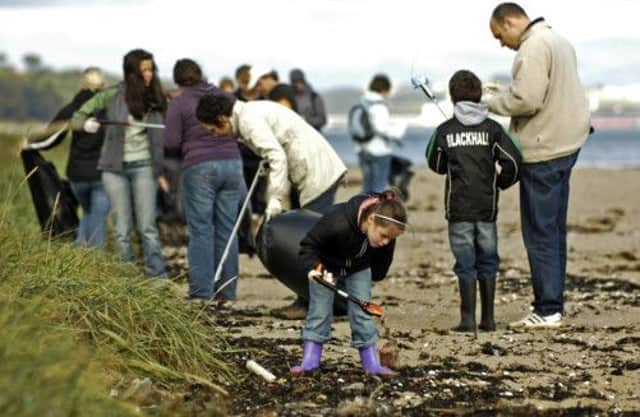Scots beaches worst in Britain for bottle litter


The country’s golden sands were littered with an astonishing 110 plastic drinks bottles for every kilometre surveyed by volunteers during the latest annual Beachwatch Big Weekend, organised by the Marine Conservation Society (MCS). The average number of discarded bottles for Britain as a whole was 75 for every kilometre covered.
And, in line with the rest of Britain, the number of cigarette stubs found on Scotland’s beaches doubled in a year, while general smoking litter – including discarded cigarette packets and lighters – soared by 90 per cent.
Advertisement
Hide AdAdvertisement
Hide AdDuring last September’s national beach clean-up, 1,958kg of litter and 20,951 individual items of rubbish were collected by volunteers on 35 beaches around Scotland’s coast.
Topping the list of shame was Monifieth beach near Dundee, where 500kg of litter was recovered. Next came the south end of Lunan Bay beach in Angus at 400kg. Third worst was Auchmithie, another Angus beach, were 125kg was recovered.
Figures from the Beachwatch survey have revealed that the amount of items of litter per kilometre across the UK has risen sharply to its highest level since 2008. On average, 2,000 pieces of litter were found per kilometre compared to 1,741 pieces the year before. In Scotland 2,041 pieces of litter were found for every kilometre, compared to 1,696 during the previous survey.
But the worst litter problem recorded was Northern Ireland, with an astonishing average of 8,224 items per kilometre.
MCS spokeswoman Clare Fischer warned that the nation’s passion for plastic was leaving a “legacy of litter” on Scotland’s beaches. “Plastic vies for space in the sand alongside sweet wrappers, cigarette stubs and drinks bottles as our beaches reveal anti-litter campaigns are now falling on deaf ears. Decades of various anti-litter campaigns may need to be repackaged for a new generation.”
She continued: “The amount of plastic overall on UK beaches in 2012 rose by 3 per cent compared to the year before. Even more concerning is the 100 per cent rise in the number of cigarette stubs found on beaches.”
MCS Scottish projects officer Anne Saunders said the continued rise in beach litter was worrying, but of more concern was the fact that much of the plastic is unlikely to break down.
She said: “As we continue to embrace the concept of a throwaway society, it’s no surprise that plastic dominates the litter we find. Last year, we saw an encouraging drop in sewage-related debris on Scottish beaches – that’s the stuff people shouldn’t put down their loos but do, like sanitary towels, nappies and condoms. But this year’s figures show that has risen again, which is very disappointing.”
Advertisement
Hide AdAdvertisement
Hide AdShe added: “Despite last summer being seen as a washout by many with heavy rain in many places, it appears those people that did visit our beaches left behind a lot of personal litter – sweet wrappers, ice cream wrappers and plastic drinks bottles failed to find their way into rubbish bins and ended up being dropped and left behind.”
A Scottish Government spokesman said: “We all have a responsibility to ensure that our rubbish is disposed of in the proper manner.
“The Scottish Government will consult on a draft marine litter strategy from this summer which will aim to address the levels of litter present in the coastal and marine environment, and contribute to international action through the European Union marine strategy framework directive.”